
Hong Kong's education system is under the spotlight after candidates for a college entrance examination were asked if the Japanese invasion of China did "more good than harm," triggering widespread criticism.
The contentious question is a sign of broader problems plaguing the city's education system, some components of which fail to inculcate in students a sense of national identity while manipulating political views.
The question appeared on the history test paper of Hong Kong Diploma of Secondary Education Examination (HKDSE), which was taken by 5,200 students. The exam is overseen by the Hong Kong Examinations and Assessment Authority (HKEAA).
Examinees were asked whether Japan did "more good than harm" to China between 1900 and 1945, sparking outcry from sections of the Hong Kong community as well as Beijing for misguiding students and disregarding Japan's invasion history.
Many likened it to asking students in the West whether they thought Hitler did more good than harm to Europe.
Last week, Hong Kong's exam authority announced it is invalidating the question and removing it from its question bank.
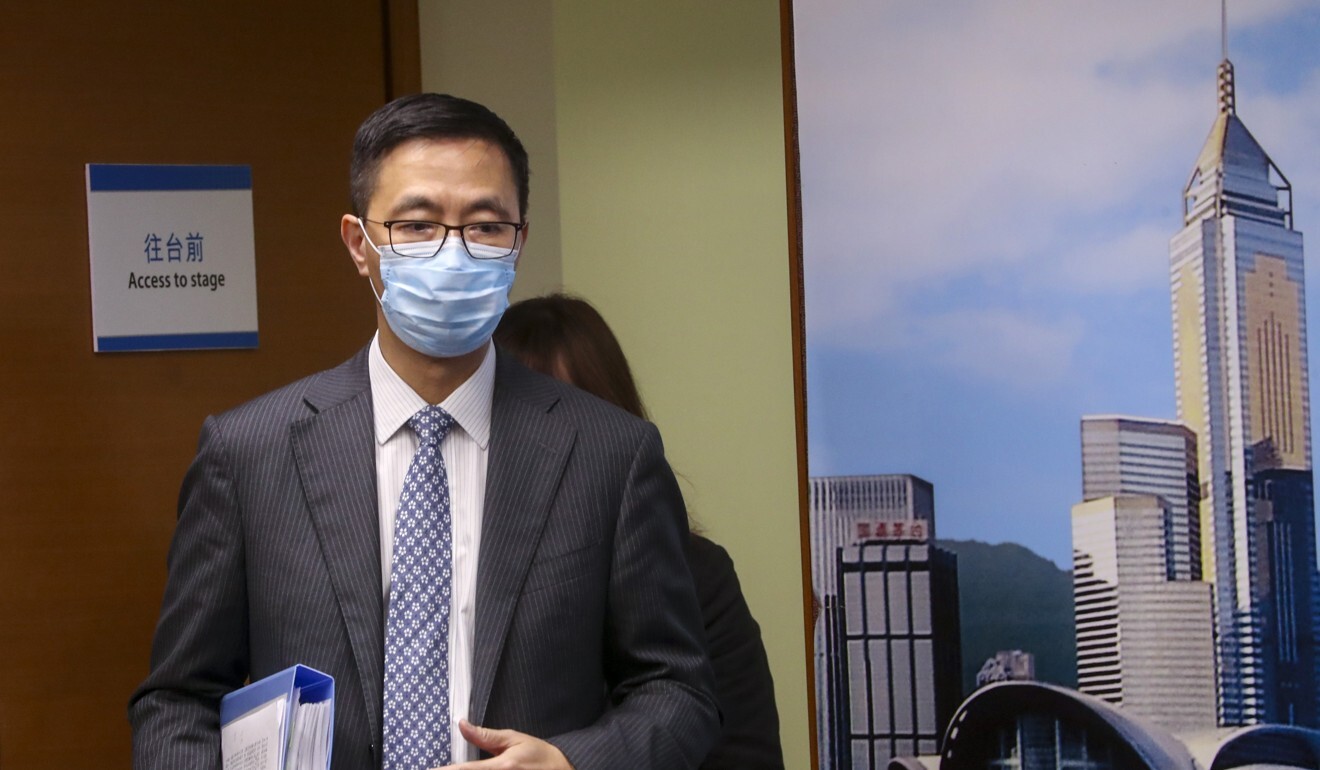
Kevin Yeung, the secretary for education of China's Hong Kong Special Administrative Region (HKSAR) government. /AFP
Kevin Yeung, the secretary for education of China's Hong Kong Special Administrative Region (HKSAR) government. /AFP
Kevin Yeung, secretary for education of China's Hong Kong Special Administrative Region (HKSAR) government, said it was unfair to grade candidates on a wrong question that deviates from objective facts.
But the storm over the history exam question is merely the tip of the iceberg as far as issues rooted in Hong Kong's education system are concerned.
Controversial 'liberal studies' at crossroads
After the implementation of a new academic structure in 2012, Hong Kong began to provide 12 years of free education, including six-year primary, three-year junior and three-year senior secondary education. The HKDSE is taken at the end of the senior secondary education.
Most students are required to take four compulsory "core subjects" – Chinese and English languages, mathematics and liberal studies.
Liberal studies, introduced as a compulsory subject in 2009, have long been blamed for radicalizing youngsters, turning the education sector into an opposition stronghold.
The subject has a general curriculum with six modules, with instructors preparing teaching materials based on current affairs without supervision or scrutiny. "Textbooks" are published by a variety of local publishers who might hold different political views and the content is sometimes one-sided and biased.
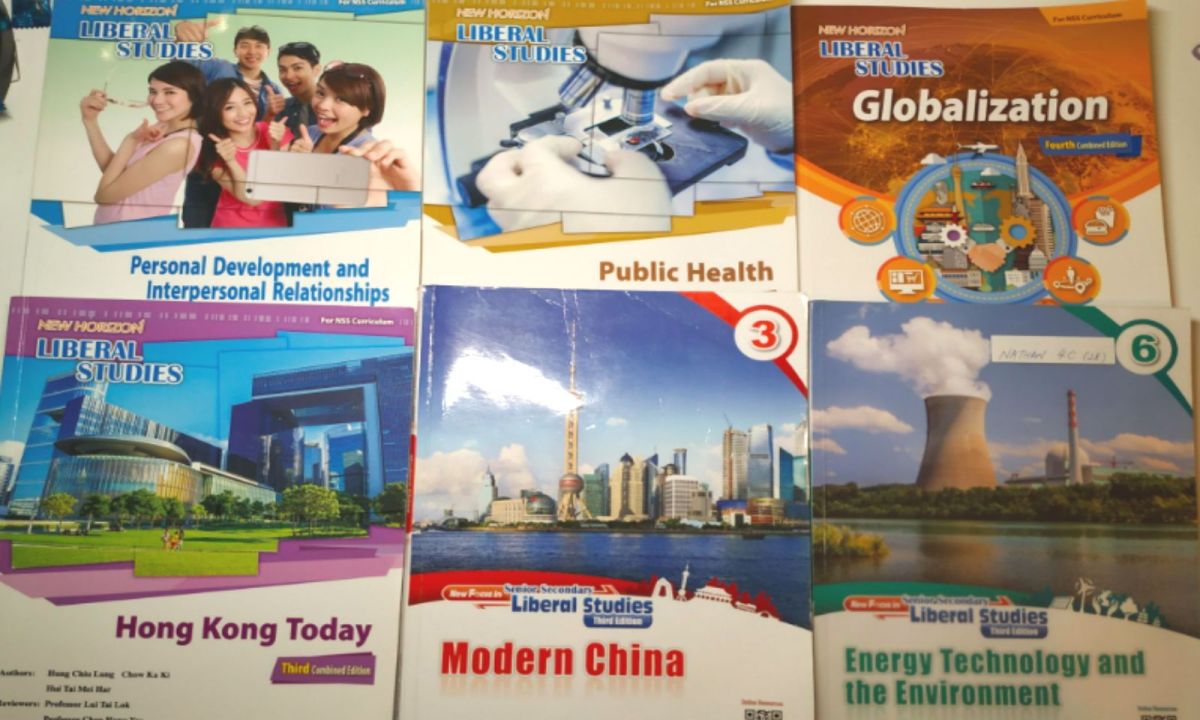
The textbooks of liberal studies curriculum in secondary education in Hong Kong. /Ta Kung Pao newspaper
The textbooks of liberal studies curriculum in secondary education in Hong Kong. /Ta Kung Pao newspaper
Tang Fei, principal of Heung To Secondary School (Tseung Kwan O) in Hong Kong told CGTN that the original intention of establishing a liberal studies curriculum is to reduce pressure on students and free them from rote learning. But the course has been used as a political instrument.
Tang believed some authorities and school teachers ditch objectivity when referring to political matters. Moreover, students have learned from the course that it is acceptable to break the law in order to achieve what they think are just causes, which to some extent has contributed to the widespread participation of young Hong Kong residents in the city's unrest since last June.
The future of the controversial "liberal studies" course for teenagers in schools will be decided as part of a wide-ranging review of the education system this year, Chief Executive Carrie Lam said in an interview with the Hong Kong-based paper Ta Kung Pao earlier this month.
She emphasized that education can't be "an unlocked chicken coop," calling on the education bureau and school administrations to serve as gatekeepers to prevent young students from being misguided.
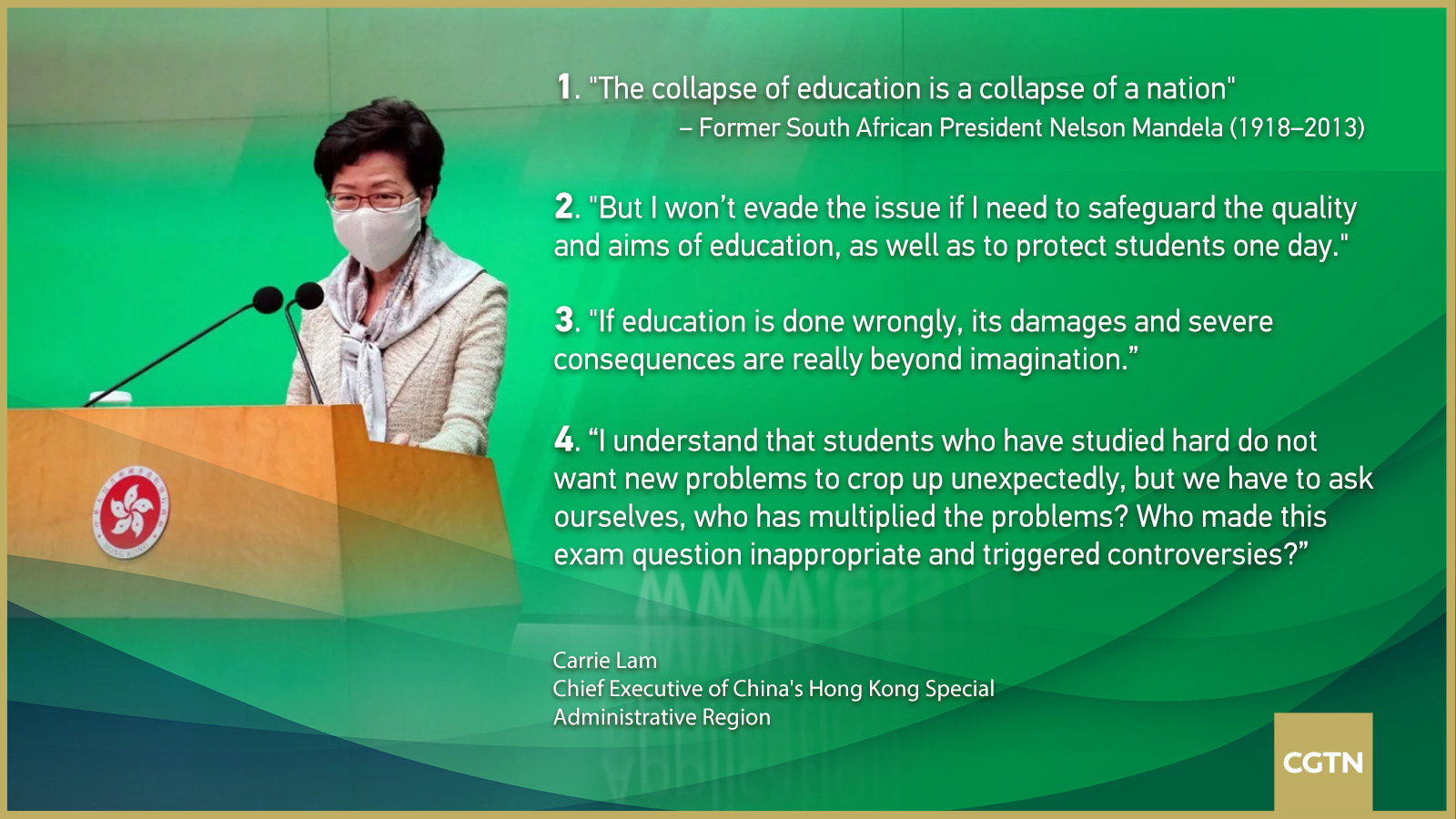
Highlights of China's Hong Kong SAR Chief Executive Carrie Lam's response to the controversial history exam question. /CGTN
Highlights of China's Hong Kong SAR Chief Executive Carrie Lam's response to the controversial history exam question. /CGTN
In 2012 when Hong Kong Special Administration Region (HKSAR) was conducting 334 curriculum reforms, the U.S. consulate sent 25 scholars from the Fulbright Program, a flagship international educational exchange program of the U.S. Department of State, for assistance. They advised and helped design a liberal studies curriculum and relevant training, which has been seen as a major way of manipulating the important courses of higher education in Hong Kong, according to local media reports.
Executive councilor Fanny Law Fan Chiu-fun, a former permanent secretary for education, said she noticed secondary schools in recent years adopting university-level teaching methods that underlined critical thinking and analytical skills.
"At secondary level, teachers should focus on providing students with elementary and background knowledge. Training for critical thinking should be left to universities," she said.
"Some secondary school students may not have sufficient knowledge to make proper judgments. There could be problems if some teachers have biased political stances."
Lack of means or loss of will in national identity?
Education in Hong Kong is said to be "colonial" as the city was under British control for over 150 years until 1997 when it returned to China. Although the city has struggled to develop its own identity, Hong Kong's basic education has not yet undergone the process of decolonization, nor has it become compatible with the "One Country, Two Systems" principle completely, Deng Fei, headmaster of Heung To Secondary School and a member of the Chinese Association of Hong Kong and Macau Studies said.
Last year, young protesters were seen trampling down Chinese national flags and defacing national emblems. They rallied outside the British Consulate in Hong Kong, claiming that only British and U.S. governments could help ensure their political demands are met.
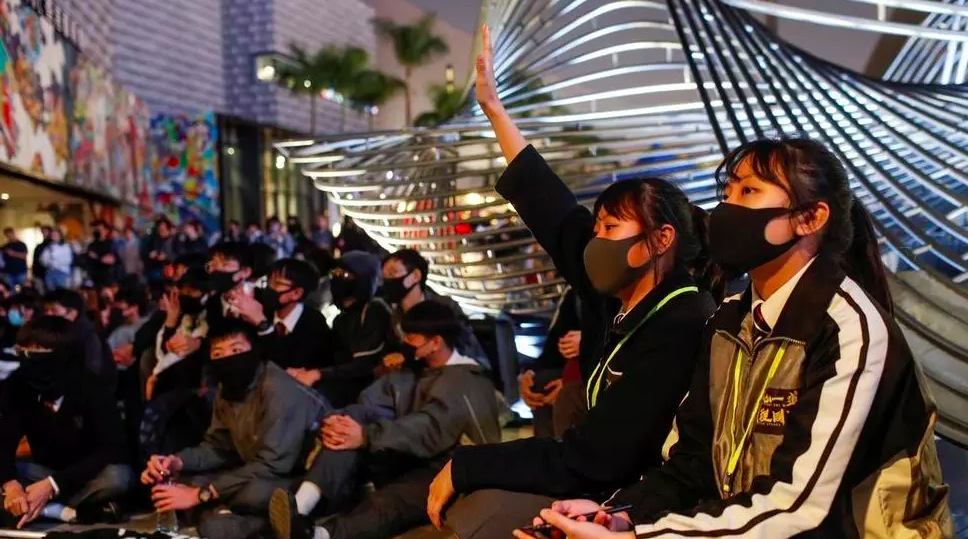
Hong Kong teenagers participate in anti-government protests in Hong Kong on December 2019. /Reuters
Hong Kong teenagers participate in anti-government protests in Hong Kong on December 2019. /Reuters
These young people are struggling with their Chinese identity and are said to be nostalgic for the days when Hong Kong was a British colony. The lack of knowledge of Chinese history has blinded them from the glamour of the country's long history and rich culture. This is also a major reason why the government is pushing on with reforms in secondary school curriculum to focus more on Chinese history as well as giving lessons on moral, civic and national education.
However, since 2012, following resistance against implementing "moral and national education" in Hong Kong, few schools have dared to restart this initiative for fear of backlash. Even in classes where students learn about China, the focus in turned to ancient history, instead of modern times, said Deng.
"Without knowing China in a comprehensive way, including both its past and present, it is extremely hard to cultivate patriotic sentiments among Hong Kong youth and create a sense of belonging as Chinese citizens."
A draft decision on establishing and improving the legal system and enforcement mechanisms for the HKSAR to safeguard national security was submitted to the third session of the 13th the National People's Congress (NPC) for deliberation on May 22. It followed a protracted period of unrest and violence that started last year in Hong Kong and has yet to subside.
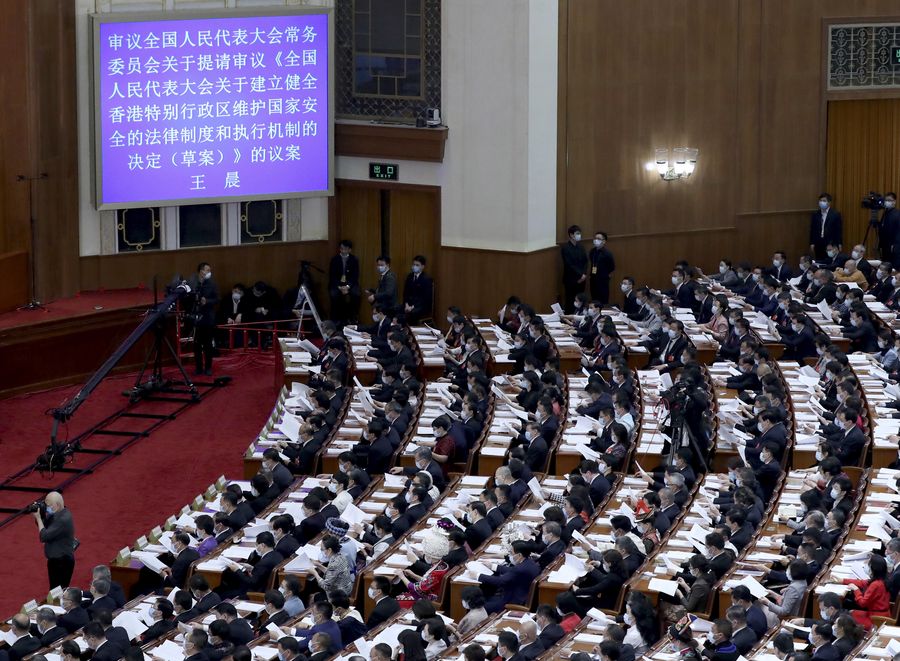
The third session of the 13th National People's Congress (NPC) opened at the Great Hall of the People in Beijing on May 22, 2020. /Xinhua
The third session of the 13th National People's Congress (NPC) opened at the Great Hall of the People in Beijing on May 22, 2020. /Xinhua
Following the draft decision, violent protests erupted in the city on Sunday, with protesters disrupting traffic, damaging property and attacking police. A number of law enforcers and civilians were hospitalized after being hit and injured by rioters.
Hong Kong Secretary for Education Yeung said Sunday's violence has proven the emergency and importance of the national security legislation. The Hong Kong Education Bureau would properly consider measures to help students understand the clauses and meaning of the bill in the future.
Many youngsters in Hong Kong have voiced support for introducing the legislation, expressing belief that it can ensure a stable environment to allow them to focus on study, work and pursue their dreams.